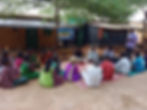OUR PROGRAMMES
FOCUS AREAS
Sustainable Development: working on climate resilience & adaptation, and supporting regenerative livelihoods
Local Governance: supporting Panchayats and building community leadership
Empowering through Education: creating contextual programmes and pedagogies for Climate Action and Intercultural Dialogues
Centering the Most Vulnerable: with a focus on Women, Children, Adivasis, and Dalits
The 572-millimetres rain in two days triggering massive landslides in Wayanad shook the nation. Beyond the rising death toll and large-scale devastation is the question being asked of authorities in Kerala as well as across India’s hills, cities and towns that are expanding rapidly: how much natural ecology can be cleared, hacked, bent, controlled and colonised for development?

In the past 2 months, heatwaves have been declared across India and around the world, affecting millions of people. According to global climate projections, the number of hot days and nights will continue to rise globally. With continued inaction, parts of the world that are currently populated will be too hot to live in.

India’s third-most populous city is facing the worst potable water crisis in its nearly 500-year history. Over 30 localities under the Bruhat Bengaluru Mahanagara Palike (BBMP) are already receiving water on a rotational basis every alternate day. Everything at the moment portends to a Day Zero scenario with the next monsoon forecasted to be still 100 days away.

Perhaps surprisingly, this was the first COP to officially acknowledge that fossil fuels are the root cause of climate change. And it is worth remembering that fossil fuels were only first mentioned in an international climate agreement in 2021 at COP 26 in Glasgow. Yet it still lacked ambition.

How can we save our biodiversity from the harmful impacts of human activity? Who are our heroes preserving and thriving in this healthy co-existence with the more-than-human world?

How can we save our biodiversity from the harmful impacts of human activity? Who are our heroes preserving and thriving in this healthy co-existence with the more-than-human world?

With a convergent socio-economic and ecological crises, how are communities at the margins taking steps and measures to ensure their families are nutritionally secure and cared for?

With a convergent socio-economic and ecological crises, how are communities at the margins taking steps and measures to ensure their families are nutritionally secure and cared for?

With a convergent socio-economic and ecological crises, how are communities at the margins taking steps and measures to ensure their families are nutritionally secure and cared for?

OUR PUBLICATIONS
Over the past 3 decades, dissemination of critical learning materials and publications in and around the realms of ecology, community, spirituality, systems transformations and the like has been a key focus for Pipal Tree.
We have two kind of publications: a) books, b) newsletters.
The recent ones are on the right here and you can write to us at coordinator@pipaltree.org.in for any further specific information.

Fireflies Intercultural Centre
At Fireflies Intercultural Centre, members have opportunities to study and take action on local environmental issues, to empower women and organic farmers, to promote peace among communities in conflict, to tend to trees and gardens, to help in the conservation of our fast-depleting water resources, and to welcome a steady stream of local and international visitors.







